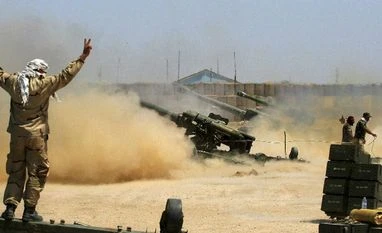More than 500 suspected Islamic State (IS) members have been arrested trying to sneak out with fleeing civilians since forces ramped up efforts to retake Fallujah, one of the group's most emblematic bastions, two weeks ago, Iraqi forces said on Monday.
"We have arrested 546 suspected terrorists who had fled by taking advantage of the movements of displaced families over the past two weeks," said Hadi Rzayej, the police chief for Anbar province in which Fallujah is located.
"Many of them were using fake IDs," he told AFP from the southern edge of Fallujah, where Iraqi forces are pressing a three-week-old offensive to retake the city from IS.
"Daesh (IS) is fleeing among the civilians, we have arrested many and are investigating the suspects," said Abdelwahab al-Saadi, the overall commander of the three-week-old Fallujah operation.
Until last week, an estimated 50,000 civilians were still trapped in the centre of the city, which is one of the jihadist group's last bastions in Iraq and lies only 50 kilometres (30 miles) west of Baghdad.
The Iraqi army on Saturday opened a corridor to the southwest of the city that has allowed thousands of civilians to escape IS rule and reach displacement camps.
According to the Norwegian Refugee Council, that runs several of them in Amriyat-al-Fallujah, south of Fallujah, more than 4,000 people were able to flee via the corridor on Saturday and Sunday.
Yet the flow of residents fleeing via the corridor and through the Al-Salam intersection to the southwest of the city, appeared to dry up on Monday, the NRC's Karl Schembri said.
"We haven't seen a continuation of the trend," he said, adding that groups of civilians were believed to be trapped in several northern Fallujah neighbourhoods.
He said nonetheless that more than 2,600 new arrivals had been recorded in displacement camps on Monday, mostly civilians from the outskirts of the city.
"We have arrested 546 suspected terrorists who had fled by taking advantage of the movements of displaced families over the past two weeks," said Hadi Rzayej, the police chief for Anbar province in which Fallujah is located.
"Many of them were using fake IDs," he told AFP from the southern edge of Fallujah, where Iraqi forces are pressing a three-week-old offensive to retake the city from IS.
More From This Section
When civilians reach government forces, teenage boys and adult men are screened separately. Some are released after a few hours while others undergo more thorough interrogation.
"Daesh (IS) is fleeing among the civilians, we have arrested many and are investigating the suspects," said Abdelwahab al-Saadi, the overall commander of the three-week-old Fallujah operation.
Until last week, an estimated 50,000 civilians were still trapped in the centre of the city, which is one of the jihadist group's last bastions in Iraq and lies only 50 kilometres (30 miles) west of Baghdad.
The Iraqi army on Saturday opened a corridor to the southwest of the city that has allowed thousands of civilians to escape IS rule and reach displacement camps.
According to the Norwegian Refugee Council, that runs several of them in Amriyat-al-Fallujah, south of Fallujah, more than 4,000 people were able to flee via the corridor on Saturday and Sunday.
Yet the flow of residents fleeing via the corridor and through the Al-Salam intersection to the southwest of the city, appeared to dry up on Monday, the NRC's Karl Schembri said.
"We haven't seen a continuation of the trend," he said, adding that groups of civilians were believed to be trapped in several northern Fallujah neighbourhoods.
He said nonetheless that more than 2,600 new arrivals had been recorded in displacement camps on Monday, mostly civilians from the outskirts of the city.
)